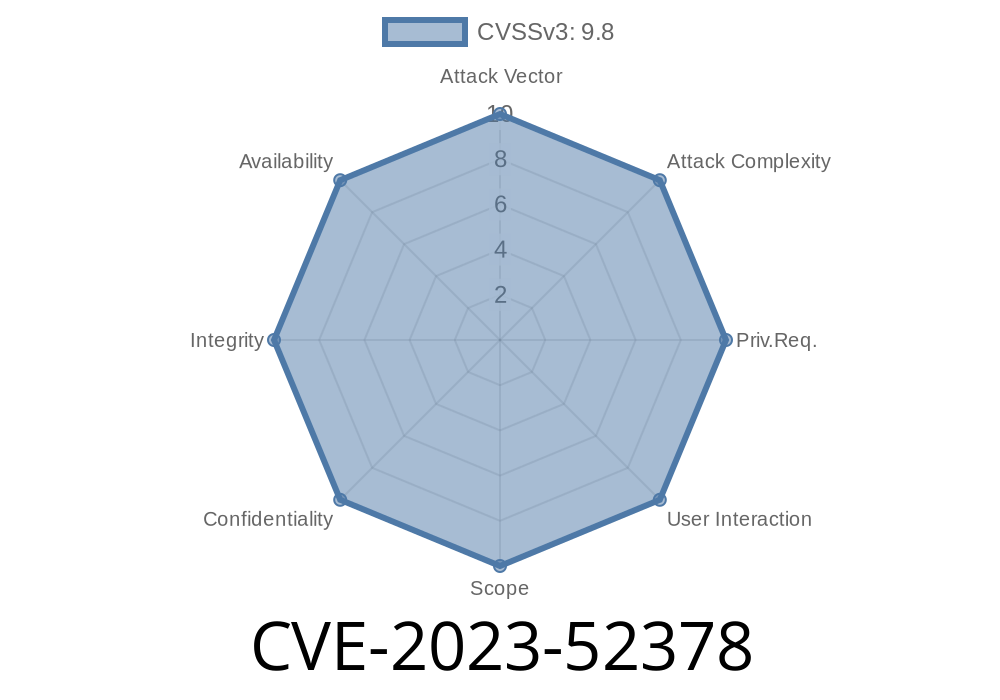Security vulnerabilities can often go unnoticed until malicious actors find a way to exploit them. CVE-2023-52378 is one such case where incorrect service logic in the WindowManagerServices module can disrupt system features and even open doors for attacks. In this post, we'll break down what the vulnerability is, why it matters, include related code snippets, demonstrate how it may be exploited, and offer practical guidance for mitigation.
Summary of the Vulnerability
CVE-2023-52378 concerns a flaw in the way the WindowManagerServices module processes service requests. When certain API calls are not validated correctly, attackers can trigger unexpected behaviors, making system features act abnormally or creating denial-of-service situations.
Component Affected: WindowManagerServices
- Type: Incorrect Service Logic / Improper Input Validation
Simple Scenario
Let’s say an application requests the window manager to open or modify a window using a native API call. The service is supposed to check:
If the window type is supported.
Due to incomplete validation (for example, skipping certain boundary checks), malicious or buggy apps can send intentionally bad data, causing the WindowManagerServices to misbehave.
Code Example (Simplified)
Below is an illustrative (not actual) snippet representing the flawed logic in the service handler.
// Vulnerable WindowManagerServices snippet
public void handleWindowRequest(ClientState client, WindowRequest request) {
// Assume permission already checked (but sometimes not!)
if (request.getWindowType() < || request.getWindowType() > MAX_TYPE) {
// Invalid window type
throw new IllegalArgumentException("Window type out of range!");
}
// Here's the problem: no check for null or invalid stack index!
int stackIdx = request.getStackIndex();
// ... code continues, assuming stackIdx is valid
// Do something with stackIdx
mWindowStacks.get(stackIdx).addWindow(request);
}
What’s missing:
No check is performed to make sure stackIdx is in the valid range, or if the stack even exists. An attacker can send a malicious request with an invalid stack index, causing crashes or undefined behavior.
An attacker could exploit this in a few different ways
- Denial of Service (DoS): By sending an out-of-bounds stackIdx, the system may throw an unhandled exception, crashing the whole window manager or making certain UI features unresponsive.
- Feature Manipulation: Incorrect stack assignments may cause windows to appear in unintended positions, become inaccessible, or even overlay across security boundaries.
- Security Bypass: In some configurations, attackers may trick the WindowManager into granting overlays without proper checks, leading to spoofing attacks.
Proof-of-Concept (PoC)
Here’s a simplified demo written as a test function, illustrating how a malformed request could crash the service:
// Malicious test client's window request
WindowRequest maliciousRequest = new WindowRequest();
maliciousRequest.setWindowType(1); // valid type
maliciousRequest.setStackIndex(9999); // invalid stack index
try {
windowManagerService.handleWindowRequest(currentClient, maliciousRequest);
} catch (Exception ex) {
// Service crashes or throws security exception
System.out.println("Exploit successful: " + ex.getMessage());
}
Apps can appear stuck or broken after a malicious app runs.
- System UI or critical features (like task switchers, notifications) may become inaccessible until reboot.
References and Further Reading
- NVD Entry for CVE-2023-52378
- Original Vulnerability Report (Huawei Security Bulletin)
- OWASP: Improper Input Validation
- Android WindowManager Overview (developer.android.com)
Permission Hardening: Only grant window overlay and related permissions to trusted apps.
- App Review: Developers should use stricter input validation and error handling when dealing with system services.
- Monitor Logs: Look out for WindowManager-related crashes or repeated errors after using certain apps.
Conclusion
CVE-2023-52378 is a solid reminder that even small lapses in input validation can have wide-reaching effects on system reliability and security. By keeping systems updated and practicing secure coding habits, we can make it much harder for vulnerabilities like this to cause harm.
*Exclusive to this post: always double-check the logic behind your service APIs—one missed check can open the window to exploitation!*
Timeline
Published on: 02/18/2024 07:15:08 UTC
Last modified on: 12/06/2024 20:03:29 UTC
